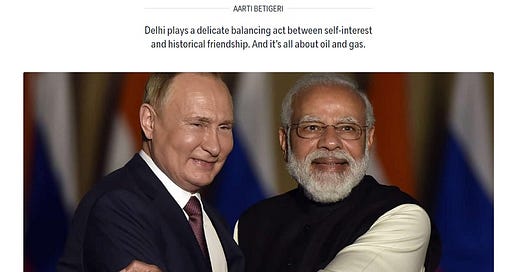The Lowy Institute Showed Its Ignorance Of India’s Balancing Act
Indian officials like External Affairs Minister Subrahmanyam Jaishankar have compellingly articulated their country’s principled neutrality at this very unpredictable moment of the global systemic transition to multipolarity so there’s no legitimate reason why the Lowy Institute's Aarti Betigeri or any other observer still can’t recognize this grand strategic reality. The only plausible explanations are that they’re either so deluded with their own discounted paradigms of International Relations and/or are deliberately trying to spread misinformation about India’s motives.
The Lowy Institute is regarded as one of Australia’s top think tanks, which is why it’s so surprising that its latest piece about India’s balancing act in the New Cold War between the US-led West and Russia was chock-full of ignorance. Contributor Aarti Betigeri, who’s a multi-platform journalist and former foreign correspondent based in Canberra, published a piece on Monday titled “India and Russia: friends for
a reason, friends for a season” in which she posited that India is opportunistically exploiting Russia’s discounted sale of oil in a brazen way that contradicts its Western partners’ values.
According to her, this not only makes that civilization-state a “financial backer” of the Russia’s ongoing special military operation in Ukraine, but also puts it in the same league as its Chinese and Pakistani rivals. While Betigeri cited External Affairs Minister (EAM) Subrahmanyam Jaishankar’s sharp rebuttal to Western criticism about this earlier in the summer to her credit, she nevertheless refused to pay it any credence and instead continued implying that this is an unprincipled move that risks isolating that country from the West.
With all respect to that expert, she should know better after almost half a year since the latest phase of the Ukrainian Conflict began if she sincerely aspired to understand the objective reality of India’s balancing act in this respect. Far from being driven by a desire to scoop up a bunch of oil on the cheap, it’s actually motivated by Delhi doing everything that’s required to preemptively avert its special and privileged Russian strategic partner’s potentially disproportionate dependence on China by functioning as its irreplaceable valve from Western pressure.
Under no circumstances can India ever allow Russia to slip into a relationship of “junior partnership” with the People’s Republic lest that South Asian state itself be compelled by circumstances into becoming the US’ own “junior partner” in a last-ditch effort to restore the regional balance. That’s absolutely unacceptable for both Great Powers, hence why India isn’t just providing financial relief to Russia through its massive purchase of that country’s discounted oil by fifty times, but is also prioritizing the North-South Transport Corridor (NSTC) and Vladivostok-Chennai Maritime Corridor (VCMC).
The Kremlin acknowledges the unparalleled help that India has provided it in preserving a sense of balance in Russian-Chinese relations, which was very strongly implied by the congratulatory messages sent by President Putin, the Russian Foreign Ministry, and Ambassador Denis Alipov on its Independence Day. Indian officials like EAM Jaishankar have compellingly articulated their country’s principled neutrality at this very unpredictable moment of the global systemic transition to multipolarity so there’s no legitimate reason why Betigeri or any other observer still can’t recognize this grand strategic reality.
The only plausible explanations are that they’re either so deluded with their own discounted paradigms of International Relations and/or are deliberately trying to spread misinformation about India’s motives. Writing that India’s in the same league as its Chinese and Pakistani rivals seemingly isn’t intended as an innocent observation but as a political provocation designed to discredit that country’s policies. Only Betigeri and those other experts who continue to get it so wrong can account for their reasons, but it’s important that the public is made aware of the fact that their assessments are absolutely inaccurate.




